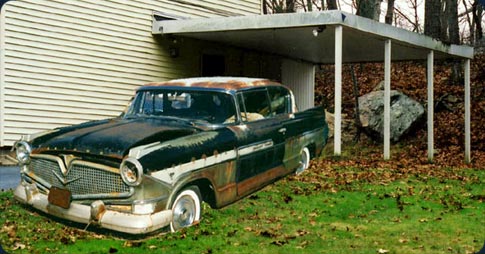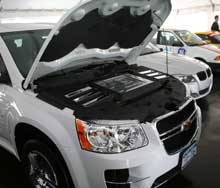I've Seen the Future
Last week I attended an intriguing media event. The folks at Consumer Reports hosted a confab on "The Future of the Car" at their automotive testing site in East Haddam, Connecticut. CR had invited manufacturers to bring their latest alternative fuel vehicles for show-and-tell, and also brought in some local privateers to show what enthusiasts themselves can do.
GM and Ford were on hand, as well as import manufacturers Audi, BMW, Honda, Mercedes-Benz, Nissan and Smart. Not only did we get presentations on the automakers' forward-looking development programs - they let us drive some of the cars over CR's extensive road course, despite atrocious weather.
The range of technologies was extensive. GM had a hydrogen fuel cell Equinox, while Ford showed diversity of propulsion with both an Escape plug-in hybrid and a Lincoln MKS powered with their new EcoBoost twin turbo engine. EcoBoost is a further development of the familiar turbocharger, which provides boosted acceleration from a small engine during the infrequent periods that full-throttle driving is required, and fuel-sipping operation otherwise. Ford sees a big payoff for its light truck lines.
Audi had a new Q7 diesel, and BMW had two oil burners, a 335d and the new "baby Bimmer" 123d. BMW, however, sees the future as hydrogen-powered internal combustion, so a 7-series "H7" sedan was on demo for the journos to experience.
Honda really did show us the future, for their demo car was all-new, the Clarity with Hydrogen fuel cell power. Nissan was a bit more conventional, with an Altima hybrid and X-Trail fuel cell vehicle. Mercedes' gambit was their "BlueTEC" diesel, in both M-Class and G-Class forms. Unlike any of the others was the now-familiar smart. I've written about smarts before, but this was my first chance to drive one, so I eagerly joined the queue that quickly formed.
The organizers had invited some local members of the Electric Auto Association, Bob Rice, who has converted a 1989 VW Jetta as a battery electric, eschewing all forms of petroleum power, and David Delman, whose DeLorean indeed seemed headed back to the future - with an engine compartment full of batteries, a clean electric motor installation and control equipment in the forward compartment (so where would you put your golf clubs...?). Undriven and unexplained was the Myers NmG, which seems to be a revival of the Corbin Sparrow.
I drove the Equinox fuel cell vehicle, the Escape plug-in hybrid, a Mercedes BlueTEC and two of the Bimmers. The first three of these demonstrated how seamless these vehicles have become. They all acted and felt much like any contemporary internal combustion car with an automatic transmission. The two Bimmers impressed me particularly, the 7H because it was running on pure hydrogen and the 335d because of its incredible torque. Of all the cars, the 335d was my favorite because of its visceral appetite for acceleration. The contrast between it and the 7H was perhaps partly down to the difference between a straight six and a V-12. I'd have to sample the corresponding gasoline cars to be sure.
About getting smart: This car is a genre unto itself, sharing nothing with the others. It is small, economical and inexpensive, things the others were not. It also creaks and rattles, its short wheelbase rocks over bumps and the automatic manual transmission lunges on full throttle acceleration. Before dissing it completely I'd have to try its actual US marketplace competition, the econoboxes from Kia, Hyundai or Chevrolet/Daewoo. An electric smart has been shown in Paris, so perhaps we'll see an alternative fuel model on our shores in the near future.
A discussion followed, in which manufacturers explained their visions for the future and answered questions. They had demonstrated that all the concepts will work. Which one(s) will become viable depend on things like infrastruture and cost. I have seen and driven the future. I just don't know which one(s) it will turn out to be.

